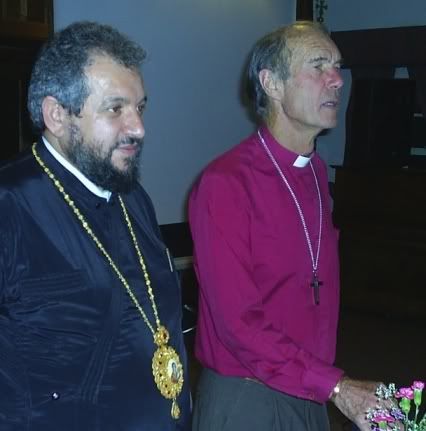War could last 30 years:
New report calls for complete rethink on Iraq
The recent political changes in Washington may make very little difference to the conflicts in Iraq and Afghanistan, and there is every prospect of the 'war on terror' extending for 30 years or more.
This is the stark conclusion of the 2006 International Security Report,
Into the Long War, launched today by Oxford Research Group (ORG), one of the UK's leading global security think tanks, and published by Pluto Press.
The report, written by ORG's global security consultant, Professor Paul Rogers, analyses events over the last year in Iraq and the wider Middle East and points to the transformation of the war on terror into what the Bush Administration now calls the "Long War".
The dilemma facing the United States now is that if it withdraws from Iraq, jihadists groups may be able to operate without restraint in the heart of the world's most important oil-bearing region.
If it stays, though, then US soldiers become an increasing magnet for radical factions, with Iraq becoming a training ground for new generations of paramilitaries, just as Afghanistan was in the 1980s against the Soviet occupying forces.
The fundamental mistake was to terminate the Saddam Hussein regime by force, since this provided a "gift" to al-Qaida and other radical groups by inserting 150,000 American troops into the heart of the Arab world as what is seen across the region as an occupying force.
Meanwhile, the war in Afghanistan itself is now into its sixth year with a marked increase in Taliban activity at a time of record revenues from opium production. As well as NATO's forces, the United States has committed 20,000 troops to the country in a largely unreported
counter-insurgency operation that shows no sign of ending.
In spite of all of these problems, though, the hard-hitting report concludes that:
"There still lies the enduring importance of the Persian Gulf oil reserves, with both the United States and China increasingly relying on the region, which means that it would be entirely unacceptable for the United States to consider withdrawal from Iraq, no matter how insecure
the environment." pp.135-36
What is required is a complete re-assessment of current policies but that is highly unlikely, even with the recent political upheavals.
This is because, although the Democrats now control both houses of Congress, there is virtually no commitment to a full withdrawal from Iraq. Instead there are various moves to modify policy, including the option of withdrawing from the cities to a few major bases, but none
amounts to a really substantial change.
Commenting on those changes needed, Professor Rogers said
"Most people believe that the recent elections mark the beginning of the end of the Bush era but that does not apply to the war on terror.
In reality there will be little change until the United States faces up to the need for a fundamental re-think of its policies.
So far, even with the election results, there is no real sign of that."
ORG's Executive Director, Dr. John Sloboda, added:
"There is a growing consensus among those who have actually seen service in Iraq that the coalition presence is inflaming the problem, rather than being part of the solution.
Our June 2006 submission to the Iraq Study Group urged that 'the coalition should find no dishonour in recognising that most Iraqis want an end to occupation and a fresh framework could support them better in future'.
The carnage of the last six months has eroded any lingering doubt that the coalition must leave, and leave soon."
Notes to editors
1) Paul Rogers writes the International Security Monthly Briefings for the ORG website. Each year ORG compiles the briefings from the previous 12 months, together with new analysis, into an annual International Security Report. The latest of these, Into the Long War, will be published by Pluto Press on 20 November 2006. In this, Professor Rogers examines events in Iraq since May 2005 and assesses how they impact on other countries including Afghanistan, Iran and the wider Middle East.
The report charts a tumultuous period in the conflict, including a wider international perspective on the terrorist attacks in London and Sharm al Sheik, and an assessment of how US public opinion has changed as the war drags on.
2) Press copies of the report are available in hard copy only from Chris Abbott at Oxford Research Group. Please email chris.abbott@oxfordresearchgroup.org.uk or call +44 (0)20 7549 0298 to request a copy. Unfortunately, no electronic version is available.
3) The report's author, Paul Rogers, is available for interview and comment. Please email paul.rogers@oxfordresearchgroup.org.uk or call +44 (0)7867 982 061. ORG's Executive Director, John Sloboda, is also available for interview. Please email john.sloboda@oxfordresearchgroup.org.uk or call +44 (0)7787 975 689.
4) Paul Rogers is Professor of Peace Studies at the University of Bradford, and Global Security Consultant to Oxford Research Group. Professor Rogers has worked in the field of international security, arms control and political violence for over 30 years. He lectures at universities and defence colleges in several countries, and has written over 20 books. He is also a regular commentator on global security issues in the both the national and international media.
5) Oxford Research Group (ORG) is an independent British think tank which seeks to bring about positive change on issues of national and international security. Established in 1982, it is now considered to be one of the UK's leading global security think tanks. ORG is a registered
charity and uses a combination of innovative publications, expert roundtables, residential consultations, and engagement with opinion-formers and government, to develop and promote sustainable global security strategies. In 2003, Oxford Research Group was awarded
the Niwano Peace Prize, and in April 2005 The Independent newspaper named ORG as one of the top twenty think tanks in the UK.
www.oxfordresearchgroup.org.uk
